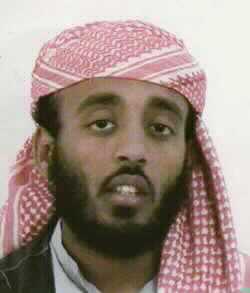The United States took custody of key al Qaeda suspect Ramzi Binalshibh in Pakistan and flew him and four other suspects to a secret location outside that country, U.S. and Pakistani officials said on Monday. The U.S. officials told Reuters that Binalshibh, captured last week in Karachi and accused of playing a key role in planning the September 11, 2001, attacks on America, was not taken to the United States.
"We have control of him. We're talking to him," said one U.S. official, who asked not to be identified.
"We have handed over a total of five suspects to the U.S. authorities, including Ramzi. They have been handed over to the United States and they must have been flown out of Pakistan," Maj. Gen. Rashid Qureshi, the spokesman for Pakistan's military government, told Reuters.
The U.S. officials said Binalshibh and the other suspects arrested after a shootout last Wednesday -- the anniversary of the September 11 attacks -- were flown out of the country. They would not say where, but said Binalshibh was not in U.S. military custody.
President George W. Bush said Binalshibh's arrest shows Americans had not grown weary of the war on terrorism but in fact are as determined as ever.
"He's the one that thought he was going to be the 20th bomber," Bush said in Davenport, Iowa. "He thought he could hide. He thought he could still threaten America. But he forgot the greatest nation on the face of the Earth is after them, one person at a time."
"MESSAGE TO OTHER TERRORISTS"
At the Pentagon, Defence Secretary Donald Rumsfeld said the capture of Binalshibh would advance the war on terrorism.
"Oh, it does," Rumsfeld said at a briefing. "Let there be no doubt, it sends a message to other terrorists.
"The more of these people that are rolled up and put in jail and interrogated, the more difficult it is to recruit, the more difficult it is to retain people, the more difficult it is to raise money, the more difficult it is to transfer money, the more difficult it is for those folks to move between countries, the more careful they have to be in everything they do."
Rumsfeld said it was up to Bush to decide whether Binalshibh would face a U.S. military commission, and that to his knowledge, the president had not yet addressed this.
Binalshibh, a Yemeni national, is said to have been a prominent member of an al Qaeda cell based in Hamburg, Germany.
He is accused of playing an important role in planning the attacks on the United States along with another member of that cell, Mohamed Atta, the suspected ringleader of the 19 hijackers who crashed jetliners into the World Trade Center, the Pentagon and in Pennsylvania.
The German government had issued an international arrest warrant for Binalshibh, but said on Sunday it was prepared to stand aside in favour of Washington.
Binalshibh is one of the most important al Qaeda members to be taken into custody over the past year, although he was not as high in the organisation as Abu Zubaydah, who was captured in Pakistan in March.
Binalshibh was captured in the sprawling port city of Karachi after a three-hour shootout.
Like Zubaydah, Binalshibh was spirited out of the country in secret. Zubaydah was handed over to U.S. authorities shortly after his arrest in the city of Faisalabad and is now being interrogated at a secret location outside the United States.
PHOTO CAPTION
Undated photo released January 17, 2002 by the U.S. Government of Ramzi Binalshibh. Ramzi Binalshibh, wanted in connection with the September 11 attacks, was captured in Pakistan. REUTERS/Handout
- Author:
News Agencies - Section:
WORLD HEADLINES


 Home
Home Discover Islam
Discover Islam Quran Recitations
Quran Recitations Lectures
Lectures
 Fatwa
Fatwa Articles
Articles Fiqh
Fiqh E-Books
E-Books Boys & Girls
Boys & Girls  Women
Women










